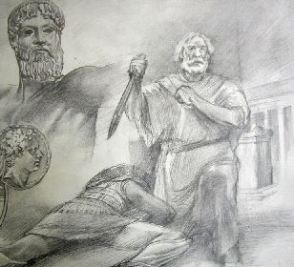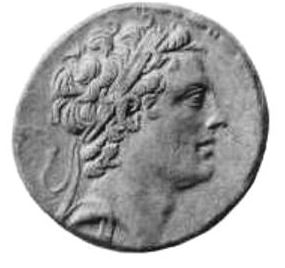9:26 “And after the sixty-two weeks an anointed one will be cut off and no one will come to his aid. Then the people of the coming prince will spoil the city and the sanctuary. But his end will come with a flood unto an end; a war is being decided; desolating things.”
9:27 “He will confirm a covenant with the great ones for one week. But in the middle of the week he will remove the sacrifice and the grain offering; and upon a wing of abominations he will be desolating, up to the point of a complete destruction being decided which will be poured out upon the one desolating.”
Quite a few remarks need to be stated in regard to this passage. I will number them for the sake of making organized conversation points:
- As I noted in the previous post, these two verses focus entirely upon the events after the initial two periods of history (‘seven’ weeks and ‘sixty-two’ weeks). In other words, the final week of the Seventy Weeks prophecy gets the most attention, making its events the crux of the passage’s emphasis.
- The beginning of this passage moves the listener over a long period of time up to this decisive moment where an anointed figure will be killed. Since there is a massive sixty-two week period separating these events from those described in 9:25, it seems obvious that the anointed figure in 9:26 is not the same individual as the one back in 9:25. It has been common ground for Christians to regard this anointed figure again as the Anointed One (i.e., Jesus Christ). Again, this argument fails to hold up to scholarly scrutiny. For one, we again have the Hebrew noun mashiach without the definite article, requiring the translation “an anointed one” rather than “the anointed one.” Sadly, many modern English translations have not been entirely honest on this point. Secondly, if this were a predictive prophecy about the death of Jesus Christ, why does the passage qualify this death with “no one will come to his aid”? Shouldn’t the passage (if it were referring to the death of Jesus) say that he will be supernaturally vindicated in glorious resurrection by God the Father? Why then does the passage actually say that no one will come to his aid? This is hardly a reference to Jesus. Furthermore, the New Testament Christians (who searched the Hebrew Bible diligently for any hint of messianic predictions) never once quote Daniel 9:26 to refer to Jesus’ death. Instead, they focus primarily upon Isaiah 53 and other verses, but never once is Dan 9:26 quoted in the New Testament to refer to Jesus. This suggests that its interpretation had an accepted reading which excluded Jesus from being its object of focus.
- In fact, we possess a perfect candidate for this anointed figure
 mentioned in 9:26. In the year 171 BCE a high priest named Onias III was in fact murdered. Unfortunately for him, none of the Jews came to help him or avenge his death. Instead his brother, the Hellenistic sympathizer Jason, took control of the temple. The actions of Jason were instrumental in the events leading up to the Maccabean Revolt.
mentioned in 9:26. In the year 171 BCE a high priest named Onias III was in fact murdered. Unfortunately for him, none of the Jews came to help him or avenge his death. Instead his brother, the Hellenistic sympathizer Jason, took control of the temple. The actions of Jason were instrumental in the events leading up to the Maccabean Revolt. - Around this time, the Seleucid Empire ruled by Antiochus IV made an agreement with some of the leading officials in Jerusalem in order to hellenize the city and its people. This agreement is the “covenant” mentioned in Dan 9:27. This is recorded in detail in 1 Maccabees:In those days certain renegades came out from Israel and misled many, saying, “Let us go and make a covenant with the Gentiles around us, for since we separated from them many disasters have come upon us.” This proposal pleased them, and some of the people eagerly went to the king, who authorized them to observe the ordinances of the Gentiles. So they built a gymnasium in Jerusalem, according to Gentile custom, and they removed the marks of circumcision, and abandoned the holy covenant. They joined with the Gentiles and sold themselves to do evil. (1 Macc 1:11-15)
- After the murder of the anointed high priest Onias III the Seleucid armies, commanded by Antiochus Epiphanes, came into Jerusalem. The act of circumcision was restricted and the Sabbath was profaned. But the most detestable act was the
 placement of a statue of Zeus upon the temple’s sacrificial altar. Jews were forced to offer sacrifices to thisimage.These offensive acts are what Dan 9:26 refers to as the “spoiling of the city and the sanctuary” and what 9:27 describes as the plural “abominations.” These events were too much for the conservative Jews who were resistant to Hellenization (thus provoking the Maccabean Revolt).
placement of a statue of Zeus upon the temple’s sacrificial altar. Jews were forced to offer sacrifices to thisimage.These offensive acts are what Dan 9:26 refers to as the “spoiling of the city and the sanctuary” and what 9:27 describes as the plural “abominations.” These events were too much for the conservative Jews who were resistant to Hellenization (thus provoking the Maccabean Revolt). - As I just noted in #5, the Syrian forces led by Antiochus brought about desolating abominations upon Jerusalem and its people. Note carefully that these abominations of desolation are plural, not singular. Furthermore, they are plural objects, not persons. This is something different from what Jesus stated in Mark 13:14 (i.e., a single, personal abomination of desolation). This point should not be taken lightly; Daniel 9:24-27 refers to plural abominations as things/objects and Mark 13:14 refers to a single person who is an abomination of desolation. We should let Daniel 9 say what it wants to say and let Mark say something else (without harmonizing the two accounts). Jesus is likely reusing the terrible events of the past as a rubric to convey the future abomination of desolation.
- Daniel 9:26 promises that there will indeed be divine retribution upon the coming prince Antiochus. His end will come with a “flood” – a common prophetic
 hyperbole for a swift death (cf. Isa 8:8; 10:22; 30:28; Ezek 13:13; Nah 1:8). Furthermore, 9:27 says that a destruction has been decreed by God (divine passive). This reassures the original readers that this national catastrophe will not go unpunished by Israel’s God, encouraging them to resist the hellenizing influences in covenantal faithfulness. Antiochus IV did indeed die in the year 164 BCE.
hyperbole for a swift death (cf. Isa 8:8; 10:22; 30:28; Ezek 13:13; Nah 1:8). Furthermore, 9:27 says that a destruction has been decreed by God (divine passive). This reassures the original readers that this national catastrophe will not go unpunished by Israel’s God, encouraging them to resist the hellenizing influences in covenantal faithfulness. Antiochus IV did indeed die in the year 164 BCE. - To connect some loose ends, it is important to remember that some of the significant dates need to be kept in the forefront of these discussions:
- Onias III, the Jewish high priest, was murdered in171 BCE. This began the agreement/covenant (1 Macc 1:11-15) between the Seleucids and the leading Jews to hellenize Jerusalem and its people,
- The Syrian forces led by Antiochus halted sacrifices and offerings by placing an idol of Zeus upon the altar. This occurred in 167 BCE,
- The Maccabean Revolt ended in 164 with the cleansing of the holy temple, thus removing all of the abominations from it,
- 171 minus 164 equals 7. How many years are in a single week? Seven. When did the sacrifice and offerings cease? In the middle of this period (167 BCE).
- If the seventieth week deals with the events from 171-164 BCE, then prophetic schemes expecting a future seven year tribulation prior to the end of the age have absolutely no biblical basis for their theology.
No comments:
Post a Comment